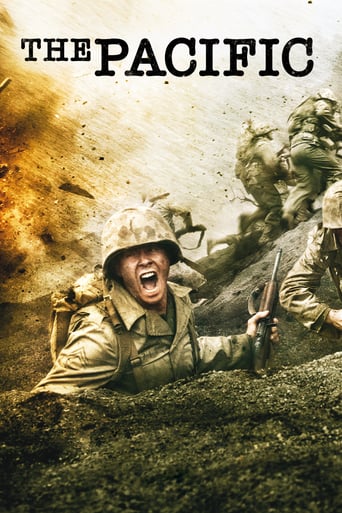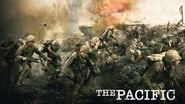gogoschka-1
I'm guessing most of us watched 'The Pacific' for at least one of the following 3 reasons:1. We have an interest in history, particularly in WW2.2. We are fans of movies and television shows (well, the good ones anyway)3. We had seen - and loved - the previous Hanks/Spielberg co-production 'Band Of Brothers' and expected a mini-series on the same level.Now from reading some of the reviews here I gather that third reason was the most important one for many viewers - and it's also why 'The Pacific' apparently left quite a few people disappointed. As for me, I wasn't disappointed - I was devastated.I'm a lucky man; I've never had to suffer through a war. But I had relatives who did, and though they're all long gone now, I'll never forget their stories. War is the most extreme and outrageous experience humans can possibly endure, but there are many different aspects and layers to it, because a war is not a single experience: it's all the experiences of all the individuals who have to suffer through it, and no single film or TV show can cover all of them. 'Band Of Brothers' focused on certain aspects of a war, and it chose a narrative that helped emphasize what the core theme of the series was: the brotherhood of war. It was about people who retain their humanity and form the closest of bonds under the worst, most horrific circumstances.That inherently human element in 'BoB' was also why we could identify so well with the protagonists, and why we were - and still are - so deeply touched by what they had to go through. It's an outstandingly well made series, and I can't imagine how those experiences by those soldiers could have been portrayed better. Which is why 'The Pacific' doesn't even try. Instead, it goes almost in the opposite direction by choosing to focus on the sheer insanity of war: the relentless horror and despair of people losing their humanity and their struggle to regain it. Of course, just like 'BoB' it's also about the heroic sacrifices of those brave soldiers, but if there is a core theme in 'The Pacific' it's that of trauma: the trauma of having your humanity stripped from you and your personality shattered; the trauma of witnessing the complete disintegration of everything you thought you were and knowing you'll never be whole again.What we see in 'The Pacific' is Hell, plain and simple. It's scores and scores of anonymous, young Japanese soldiers running senselessly into machine gun fire, wave after wave, until the piles of their bodies are so high they block the sight for the machine gun; it's American soldiers barely older than kids in despair or completely numb from the sheer amount of random death around them; it's vibrant young men turning into barely alive husks whose only remaining focus is to survive - which means they have to kill other barely alive young men who will stop at nothing to kill them in turn; it's kids killing other kids like rats by any means at their disposal: guns, knives, flame-throwers or with their bare hands; it's people living among the rotting corpses of their dead comrades and enemies and completely losing any regard for human life. And the few moments where we witness how those kids get a brief taste of how precious and beautiful life could be make their fate all the more heartbreaking.Over large stretches, 'The Pacific' is devastating and depressing to watch, and though I found it never less than compelling, it's actually easy to see why many viewers who had hoped for a similarly engaging experience as in 'BoB' were left disappointed. But this is a different story about different people who fought in a different theater of the war and who went through different experiences, and once you stop comparing it to the story of the men in Easy Company from 'BoB', you'll find that, while different, in terms of sheer quality 'The Pacific' is every bit as good and as much of an outstanding achievement as its more popular predecessor.The realism, the performances, the music and the production values in the series are superb (this was a 200 million production after all), and the attention to historic detail is simply staggering. As for me, witnessing what these men went through left me devastated; yet I am grateful I've watched 'The Pacifc': because in its relentless depiction of the horrors of war it honors the sacrifice these brave young soldiers made in the hope future generations wouldn't have to do the same. I originally rated this series 9 stars out of 10, but upon a recent rewatch and with more knowledge of the war in the Pacific theater, it's clear that this is a 10/10. Outstanding.Favorite films: IMDb.com/list/mkjOKvqlSBs/Lesser-Known Masterpieces: imdb.com/list/ls070242495/Favorite TV-Shows reviewed: imdb.com/list/ls075552387/
Mayank Agarwal
I was really excited to watch the series knowing this was a Companion piece to Band of Brothers (BOB) covering the Pacific Theater of Operations during WW-2, the series covers 1st Marine Division's battles on islands such as Guadalcanal, Cape Gloucester, Peleliu, and Okinawa. As a standalone series Pacific is excellent, but BOB being there a comparison had to be made and when done I felt Pacific to be a notch lower in almost every department. It's a different series than BOB in covering more on depressing side of the war than the heroic side.The series visualizes the war from the view point of three individuals of 1st Marine from very different backgrounds, getting into their private life. Its show how normal citizens become hero, some are heroes by action during battles, some by just surviving the war and not turning into monster. A lot of time is spend away from action, an episode covers a year spent in Australia, one recovering from battle trauma, another on finding love & getting married. The series focuses more on individual emotions & bonds, frankly the time spend away from action is not entertaining as mostly it covers the gloomy side of war, the damaged soldiers & there condition. The sad part is the time spend on war also gets repetitive after a time with most of the islands being similar in nature, the jungles with its malaria, rains, heat & the unrelenting japs. The action shown in the series is more gory then heroic, the series probably sets out portray wars as grim thing and not grand stuff and is successful at it.
crwdennis-cd
I would like to rate this an 8 or and 9, because the battle scenes on Okinawa, Iwo Jima and Pelaliu Airfield were brilliant. However, there were a few things about the series that bothered me so much I had to reduce the rating. 1. the depiction of the American marines. I know we are several generations out from 1945, but back then, people generally behaved in an honourable way. For example, the veterans did not for the most part swear at that time. They also for the most part did not fall apart psychologically or question the war, they believed they were engaged in a just war. (yes, of course there was PTSD). The marines here are depicted as sadistic and without a moral compass. Why the emphasis on cutting out the gold teeth of dead Japanese soldiers? That was just weird. 2. the depiction of the Japanese soldiers. The Japanese were depicted as if they were a weak and pathetic foe here. They just ran straight into machine gun fire. They were butchered in the thousands here for only a handful of American casualties. That is straight out wrong. The casualty ratio was around 5:1 . The Japanese were a fierce, intelligent and formidable foe. On the other hand, there was a complete whitewashing of Japanese atrocities here. The Japanese tortured those they took prisoner. They were brutal. They disembowelled prisoners. They had forced death marches. Yet here they are portrayed as the moral side somehow.3. sex and romance. You have a 10 part series, and the whole of episodes 3 and 8 were dedicated to slow-moving romance stories, with a lot of graphic sex. Why on earth were we shown the sex of Basilone's wedding night? I didn't want to be there. 4. no depiction of naval battles. It was weird going through the pacific war without Midway, Leyte Gulf, the Battle of the Coral Sea etc etc. It wasn't a clear picture of what the pacific war was. 5. Hard to warm to the characters. Basically all the main characters were depicted as scoundrels of one form or another. So it was difficult to care about what happened to them. As I said, the battle scenes were raw and brilliant at times, powerful.
Alex John
It's not a historical anything, it's just a "personal drama" over 10 episodes, with little to do with real life fighting, or how real life soldiers act, it does show some brutal stuff but it's put there only to let the viewers know it was indeed a brutal war in real life, but these are raw elements in an otherwise bland 10 episodes. The characters are not interesting and fake, the plot isn't interesting either, in fact it's typical American war movie: 1) don't show the real reason we are at war, fed the public some bs; 2) of course Americans get to have girlfriends of every nationality they want, because they're Americans; 3) personal drama and so called transformations on characters that clearly never existed in real life(and even by some miracle if they did, it's clearly not based on their actions); 4) portraying the enemy as SUPER STUPID(all the Japanese soldiers in this movie only know how to banzai charge and die like idiots), and SUPER EVIL, as if the poor Americans are hated for no reason at all; 5) portraying the Americans as fighting "a just cause", good vs. evil, and blaming the enemy for all the evil in the world, and brainwashing the average public that has no idea about history with this bs propaganda. As I said, the characters, scenes, plot, action etc. are all weak, I feel like I wasted my time watching what some guy believes happened in WW2 and not what actually happened or at least firmly based on what actually happened instead of some irrelevant and fake drama of non-existing people. Thanks for wasting my time, HBO.























